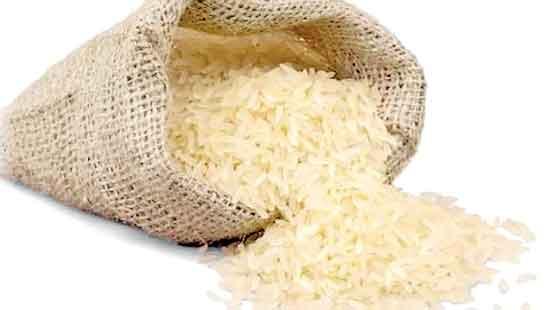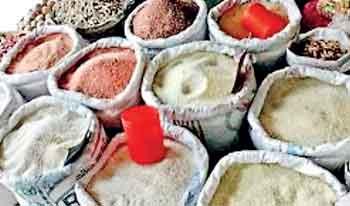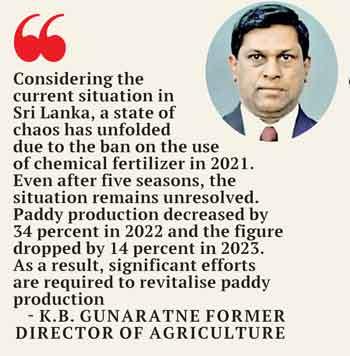Reply To:
Name - Reply Comment
Last Updated : 2024-04-29 00:02:00

A quantity amounting to 2.4 million metric tons of paddy is required to maintain a level of substantial rice consumption in this island
 As of now the mill owners have been engaged in raising the price of paddy. Given the current drought and rainfall situation that prevail these individuals are not only attempting to raise the price of paddy, but are also trying to create the illusion of a paddy shortage. The former Director of Agriculture K.B. Gunaratne when contacted questioned the Government whether there is a shortage of paddy in the
As of now the mill owners have been engaged in raising the price of paddy. Given the current drought and rainfall situation that prevail these individuals are not only attempting to raise the price of paddy, but are also trying to create the illusion of a paddy shortage. The former Director of Agriculture K.B. Gunaratne when contacted questioned the Government whether there is a shortage of paddy in the  country. The per capita paddy consumption in Sri Lanka is approximately 125 kg per year. However, due to last year’s economic crisis this figure decreased to 90 kg. Nevertheless, the per capita paddy consumption has increased to 112 kg as of now. Additionally, Sri Lankans require two hundred thousand metric tons of paddy per month. Consequently, Gunaratne pointed out that 2.4 million metric tons of paddy is needed annually.
country. The per capita paddy consumption in Sri Lanka is approximately 125 kg per year. However, due to last year’s economic crisis this figure decreased to 90 kg. Nevertheless, the per capita paddy consumption has increased to 112 kg as of now. Additionally, Sri Lankans require two hundred thousand metric tons of paddy per month. Consequently, Gunaratne pointed out that 2.4 million metric tons of paddy is needed annually.
A quantity amounting to 2.4 million metric tons of paddy is required to maintain a level of substantial rice consumption in this island. However, to achieve that approximately 3.7 million metric tons of paddy is required annually. If cultivation takes place during the Maha Season at the right time and fertilizer and other necessary requirements are provided sufficiently, a yield of 3.5-3.7 million metric tons of paddy can be obtained. If cultivation is successful during the Yala Season paddy could produce a yield of 2 million metric tons. According to Gunaratne, if there is a successful cultivation there would be a surplus of paddy.
 The last time our country achieved self-sufficiency in paddy was in 2010, 2011, and 2012, under the “Api Wawamu - Rata Nagamu” programme. “During that period, in addition to paddy cultivation other crops were cultivated, and the World Bank expressed interest in extending the programme in other countries. However, considering the current situation in Sri Lanka, a state of chaos has unfolded due to the ban on the use of chemical fertilizer in 2021. Even after five seasons, the situation remains unresolved. Paddy production decreased by 34 percent in 2022 and the figure dropped by 14 percent in 2023. As a result, significant efforts are required to revitalise paddy production,” said Gunaratne. He also said that the 1.7 million families engaged in paddy cultivation constitute a significant portion of the population.
The last time our country achieved self-sufficiency in paddy was in 2010, 2011, and 2012, under the “Api Wawamu - Rata Nagamu” programme. “During that period, in addition to paddy cultivation other crops were cultivated, and the World Bank expressed interest in extending the programme in other countries. However, considering the current situation in Sri Lanka, a state of chaos has unfolded due to the ban on the use of chemical fertilizer in 2021. Even after five seasons, the situation remains unresolved. Paddy production decreased by 34 percent in 2022 and the figure dropped by 14 percent in 2023. As a result, significant efforts are required to revitalise paddy production,” said Gunaratne. He also said that the 1.7 million families engaged in paddy cultivation constitute a significant portion of the population.
In 2022, 783,000 metric tons of paddy were imported; the venture costing 87.5 billion rupees. However, the government has been unable to control the price of paddy even at this time. A kilo of local Nadu rice, which was priced at 175 rupees, is now being sold at prices ranging from 195 to 220 rupees. Keeri Samba rice is also scarce; indicating the extent of the influence of the paddy mafia in operation at present. Despite these developments, the present government has not succeeded in eliminating this paddy mafia. Furthermore, Gunaratne affirmed “The present government has allowed large-scale private mill owners to strategically amass significant profit through their businesses”.
According to Gunaratne large-scale mill owners possess high-capacity facilities to store paddy that’s purchased from farmers. “They are also capable of buying paddy from farmers and storing it at their premises till it’s time to transport these paddy stocks. They can maintain a significant paddy stock and purchase more paddy. In contrast, the government lacks this capacity to play a tactical game. Moreover, due to inadequate storage facilities, the government is compelled to convert its paddy stocks into rice; putting itself in a position where it is unable to compete against these private mill owners. Private large-scale paddy mill owners have the capacity to process one ton of paddy into rice within an hour: owing to their modern machinery. However, the government engages in this business using outdated machinery. As a result, the government cannot produce large amounts of rice to meet the country’s requirements,” Gunaratne added.
Large-scale millers have the capacity to produce both polished rice and double polished rice. “As a result, they release double polished rice into the market. They also produce Keeri Samba rice. These producers of both short and long-grain Keeri Samba rice hold a monopoly in the Keeri Samba market. At present millers are claiming that there is a shortage of Keeri Samba rice and this control of the market is exercised through the a rice mafia. According to Gunaratne their purpose is to sell Keeri Samba at a higher price by artificially creating a scarcity of this type of rice. Keeri Samba is extensively used to prepare fried rice. The increased consumption of fried rice has generated a significant demand for both types of Keeri Samba. As a result, large-scale mill owners are purchasing Keeri Samba even from distant areas and distributing such stocks,” Gunaratne added.
 The paddy owned by the government is collected by district secretaries and handed over to the Paddy Marketing Board. Paddy stocksare gathered at Agrarian Service Centres,Paddy Marketing Board Centres, or Cooperative Society Centres. However, when purchasing this paddy, the Paddy Marketing Board (PMB) places a strong emphasis on its quality. The board (PMB) also takes into account factors such as moisture and the presence of weed seeds. Private buyers, on the other hand, do not consider these aspects. Consequently, farmers are hesitant to provide their paddy to the Paddy Marketing Board. Additionally, selling paddy to the board often requires travelling distances between 20-40 kilometres, whereas private buyers visit the fields to engage in purchasing paddy. “Farmers typically prefer to store the paddy they consume and sell the surplus. However, due to the regulations imposed by the Paddy Marketing Board, farmers are reluctant to sell their rice stock to the government. The Paddy Marketing Board also does not attempt to change these rules,” he said. Gunaratne maintained that this situation results in significant losses to the government during the process of selling paddy.
The paddy owned by the government is collected by district secretaries and handed over to the Paddy Marketing Board. Paddy stocksare gathered at Agrarian Service Centres,Paddy Marketing Board Centres, or Cooperative Society Centres. However, when purchasing this paddy, the Paddy Marketing Board (PMB) places a strong emphasis on its quality. The board (PMB) also takes into account factors such as moisture and the presence of weed seeds. Private buyers, on the other hand, do not consider these aspects. Consequently, farmers are hesitant to provide their paddy to the Paddy Marketing Board. Additionally, selling paddy to the board often requires travelling distances between 20-40 kilometres, whereas private buyers visit the fields to engage in purchasing paddy. “Farmers typically prefer to store the paddy they consume and sell the surplus. However, due to the regulations imposed by the Paddy Marketing Board, farmers are reluctant to sell their rice stock to the government. The Paddy Marketing Board also does not attempt to change these rules,” he said. Gunaratne maintained that this situation results in significant losses to the government during the process of selling paddy.
In 1970, Hector Kobbekaduwa, Minister of Agriculture in the United Front Government, established the Paddy Marketing Board through Act No. 14 of 1971. This move was taken to achieve many fundamental objectives. One of the primary objectives was to provide a guaranteed price to paddy farmers and ensure fair rice prices existed in the market for consumers. Cooperative societies purchased paddy from across the island and delivered them to the Paddy Marketing Board for storing. “Paddy stocks stored in this manner were given to private mill owners who then delivered the rice that was produced through these to government supply centres under the Food Department. The milling and transportation charges were borne by private mill owners. Subsequently, the rice was distributed to customers by the relevant units,” he said. Gunaratne said that this process was supervised by the Food Department.
However, at present, that Food Department doesn’t exist. Some cooperative societies have ceased to operate. The PMB has reduced itself to being a sluggish institution. The government has thus far been unable to curb the activities of the rice mafia. The Government is to blame for the present situation where people have to purchase rice at higher prices; thus becoming vulnerable to the rice mafia. “In the past, the Paddy Marketing Board had a significant number of storage facilities scattered across the island. Each district also had its own Paddy Marketing Board along with several paddy mills. We were also home to a rice processing facility and given recognition for possessing the largest paddy mill in Asia. There were large paddy processing centres in locations such as Anuradhapura, Polonnaruwa, Hasalaka, and Ampara.
It remains unclear as to what has happened to these facilities. Today, only the rice mill in Ampara exists. However it has been left to decay. Neither previous governments nor the present government has displayed a desire to revive these institutions. As a result, not only the purchase of paddy, but also the task of rice production has shifted to the private sector. Additionally, Gunaratne noted that several government institutions have experienced a decline due to the ineffectiveness of officials and the presence of commissions, frauds, thefts and corruption.
At present the government lacks the ability to control the influence of the rice mafia in the paddy trade. This is because the government struggles to compete against large-scale mill owners who use shrewd tactics and modern facilities. Only a handful of large-scale mill owners exist. “This raises doubts regarding the agriculture policies of the government and the regime’s capacity to deal with problems that exist in this sector. Securing food security for the nation is equal to safeguarding the nation itself. We possess the capability to produce essential rice, vegetables and fruits. Our proximity to the sea provides access to fish resources. We once had the capability to ensure sustenance and happiness of our people. However, at present, people are starving due to the poor decisions made by politicians in our country. If we aim to regain self-sufficiency in rice the current government must undertake various initiatives,” he added. Gunaratne further said that the present government appears to be more focused on preserving political power rather than addressing the needs and expectations of the citizens.
Countries such as Japan, China, South Korea, and India have small-scale rice mills. Recently, with the assistance of South Korea, a rice mill worth 5.9 million rupees was provided to the Rajangana area. This aided the production of high-quality rice. This rice was subsequently distributed across the country by farmers’ societies. Similarly, in other areas too, small-scale mill owners emerged and contributed to producing local rice. “At least now, the government should support small-scale mill owners, or revitalise cooperative societies and the Paddy Marketing Board. This will aid the process of storing paddy, converting the produce into rice and delivering the finished produced to customers. To break the paddy monopoly it is essential that the government considers taking under its control at least 10 percent of the paddy produced annually. However, such an endeavour requires careful planning,” he said. Gunaratne added that this endeavour comes under the purview of the Ministry of Agriculture.
Recently, when large-scale mill owners were selling rice at the government’s guaranteed price of Rs 220, it was observed that small-scale rice traders were selling rice at prices ranging between Rs 160-175. “Large-scale mill owners make a profit of 75 rupees per kilo of rice; which ensures they earn millions of profits every single day. For large-scale millers, the rains and droughts are a convenient smokescreen. These natural conditions give them an excuse to hike up rice prices. This is the case with the price of Keeri Samba these days. Large-scale mill owners are attempting to raise the price of rice artificially. Often, they have old paddy stocks, which are inexpensive. Private paddy mill owners are planning to increase the price of rice giving the impression that they had purchased paddy stocks recently. However, the government lacks the resolve to put a halt to this rice mafia,” he said. Gunaratne added that the general public should not expect relief from the government in this regard.
This newspaper made several attempts to inquire into all these matters by calling the Chairman of the Paddy Marketing Board, but there was no response from him.
This scribe also made several attempts to reach Dudley Sirisena, a private paddy mill operator, to find out whether there is a shortage of Keeri Samba in the market, why the price of this product is being increased and why a monopoly on rice is maintained, but there was no receive from him.
Ravi Tuesday, 14 November 2023 08:23 PM
Ohh, yes, Mr. Amaraweera there is something you can do. Since you are helpless to do anything, declare yourself redundant and depart!
Padmasiri K. P. Mendis Wednesday, 15 November 2023 05:03 PM
We are at the tail end of 2023 and not the 1970s.So, in this paddy discussion, why involve Kobbekaduwa from "7 Years Of Hell" whose government ruled the people with their socialist kaduw?Perhaps we anticipate 7 years of that hell considering the neu hell that began to display its ugly head beginning in 2021. Paddy Wickramasinghe
Adwani Wednesday, 15 November 2023 06:03 PM
It is a very simple solution, stop eating rice or try to bring the rice from the moon, as said by Mrs. Bandaranayake.
Lion Tuesday, 21 November 2023 04:56 PM
Dancing will go on for ever unless a proper government comes in to power
Ben Tuesday, 21 November 2023 08:14 PM
Rice bathala maiyokka kadala.bread even paripu majority poor can't effort what about cooking stuff for basics then to start the fire etc. But the reach become filty rich and the poor decome poor and poorer sad ..........we need the DS. The senanayakes to save the poor from heaven....
Dee Saturday, 25 November 2023 11:18 AM
Why do we need to depend on this junk? Just import. Better price/ quality even after freight,duty and other taxes!
Mr.Beans Saturday, 25 November 2023 02:07 PM
Dance the body music.we have to dance with Samba.who has time to read such a long msg.pay money and buy samba and eat.match over
Citizens Monday, 27 November 2023 07:29 AM
Who on earth has the time to read this long rubbish!! Government is anyway helpless in so many things!
Gunadasa Monday, 27 November 2023 01:36 PM
Govt is not helpless! Just import rice then all local prices will come down
sacre blieu Thursday, 30 November 2023 10:02 AM
The agriculture sector and ministry are continuing to do the "Laughing Samba"to the misery of the public and farmers.
Ron Sunday, 03 December 2023 10:51 AM
Paddy marfia got no feelings for the magority poor families that eat Rice day in day out

Add comment
Comments will be edited (grammar, spelling and slang) and authorized at the discretion of Daily Mirror online. The website also has the right not to publish selected comments.
Reply To:
Name - Reply Comment
US authorities are currently reviewing the manifest of every cargo aboard MV
On March 26, a couple arriving from Thailand was arrested with 88 live animal
According to villagers from Naula-Moragolla out of 105 families 80 can afford
Is the situation in Sri Lanka so grim that locals harbour hope that they coul

26 Apr 2024
26 Apr 2024